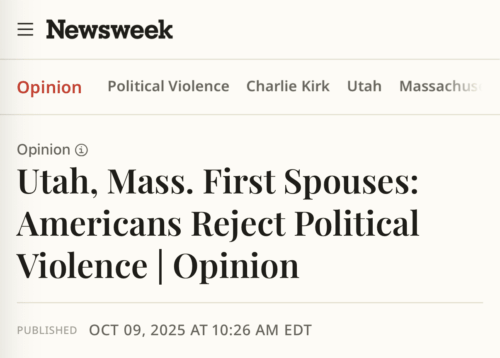En Guard
Plus: A new column from States United CEO Joanna Lydgate. 🗳️
This Week in Democracy
- A federal judge temporarily blocked the Trump administration from deploying the National Guard in Illinois. Illinois Attorney General Kwame Raoul and Chicago officials sued on Monday to block the deployment.
The ruling comes after the Trump administration ordered members of the Illinois, California, and Texas National Guards to Chicago without the consent of Illinois Gov. JB Pritzker or local officials.
In an interview with The New York Times, Oklahoma Gov. Kevin Stitt criticized the deployment, calling it a violation of states’ rights.
➡️ READ: What’s Breaking Through About National Guard Deployments
- A federal judge also temporarily blocked the Trump administration from deploying the National Guard in Oregon. The judge previously blocked the administration from federalizing the Oregon National Guard, so the administration ordered the deployment of the California National Guard instead. Dan Rayfield and Rob Bonta, the attorneys general of Oregon and California, sued to block the administration’s actions.
A group of retired senior military officers and Vet Voice Foundation, represented by States United, filed a brief on Wednesday supporting Oregon and Portland’s case seeking to block the federalization of the Oregon National Guard. “[A] military that is thrust into aggressive interactions with civilians in a politicized context will, over time, inevitably lose the respect and trust that it currently has among the American people,” the brief states.
➡️ READ: More about the brief
Officials from 24 states also filed a brief in support of Oregon and Portland, writing that the deployment of troops to Oregon without the consent of Gov. Tina Kotek “puts the constitutional rights of all Americans at risk.”
- New York Attorney General Letitia James was indicted by a federal grand jury after Trump called for charges to be brought against her. James denies any wrongdoing. The charges were brought by interim U.S. Attorney Lindsey Halligan, despite a report that one of her office’s top prosecutors believed that there was no probable cause.
Halligan last month brought charges against former FBI Director James Comey, also under pressure from Trump. Comey pleaded not guilty this week. Lawyers for Comey said they would seek to dismiss the indictment against him, claiming that the charges are vindictive and that Halligan was unlawfully appointed to her position.
Halligan was appointed after her predecessor resigned, reportedly under pressure from the administration, after he refused to charge James.
➡️ READ: Sharing the Facts About Misusing Federal Law Enforcement for Political Retaliation
- Four former Republican governors, represented by States United and Hogan Lovells, filed a brief urging the U.S. Supreme Court to reverse a lower court’s decision that would weaken the Voting Rights Act (VRA). The lower court ruled that only the federal government—not private parties like individuals or organizations—has the right to bring lawsuits under Section 2 of the VRA.
The governors—Arnold Schwarzenegger of California, Christine Todd Whitman of New Jersey, Marc Racicot of Montana, and William F. Weld of Massachusetts—strongly urged the Court to continuing allowing private parties to bring these suits, writing that they “have seen firsthand the positive deterrent effect that private Section 2 litigation has.”
➡️ READ: More about the brief
A coalition of 23 state attorneys general also filed a brief in support of the plaintiffs.
- The U.S. Supreme Court heard arguments in a case brought by U.S. Rep. Mike Bost of Illinois that could have implications for election litigation across the country. The justices will decide when candidates in elections have the ability to challenge state election laws in court.
State of the States
In Georgia, a judge granted the Prosecuting Attorneys’ Council of Georgia more time to find a new prosecutor to take over the state election interference case against Trump and his co-defendants. The council now has until noon on Nov. 14.
Last month, the Georgia Supreme Court turned down an appeal from Fulton County District Attorney Fani Willis that sought to allow her to continue prosecuting the case. (An appeals court disqualified her in December.)
Recommended Reading
States United CEO Joanna Lydgate and Utah First Lady Abby Cox co-authored a column in Newsweek urging Americans to unite across party lines and stand against political violence.
